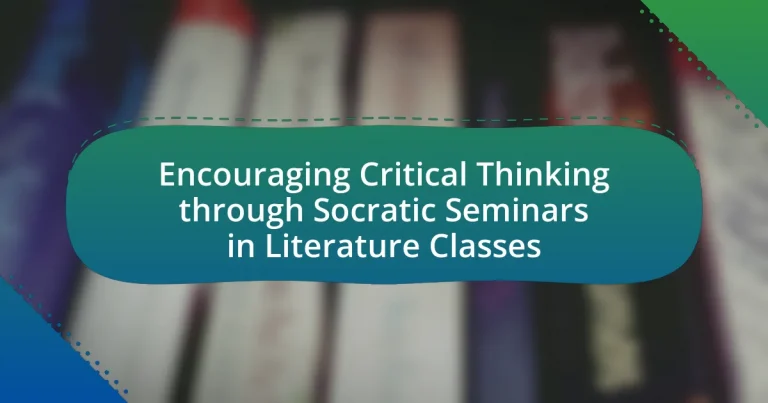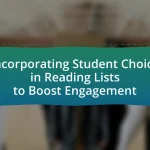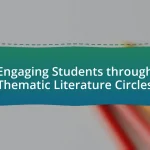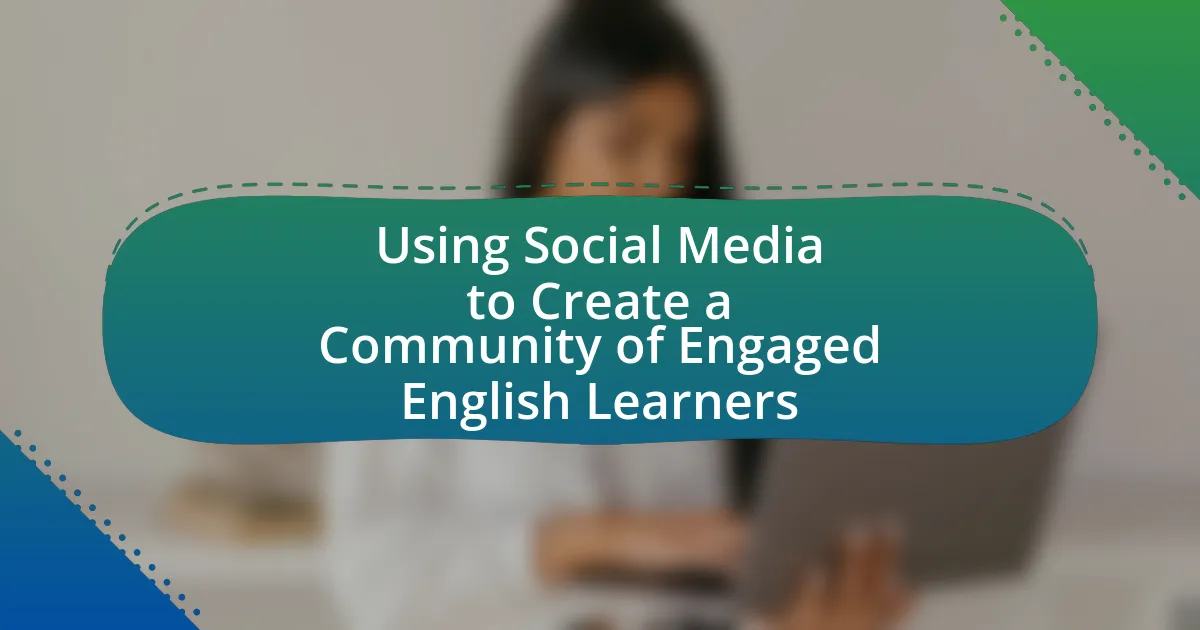Socratic Seminars are structured discussions designed to enhance critical thinking and dialogue among students in literature classes. This article explores the role of Socratic Seminars in fostering deeper understanding of texts by encouraging collaborative exploration of themes, characters, and interpretations. Key components such as open-ended questioning, active listening, and student-led discussions are examined, alongside the benefits of critical thinking in literature education. Additionally, the article addresses challenges in implementation, strategies for effective facilitation, and assessment methods to evaluate student contributions, providing a comprehensive overview of best practices for educators.
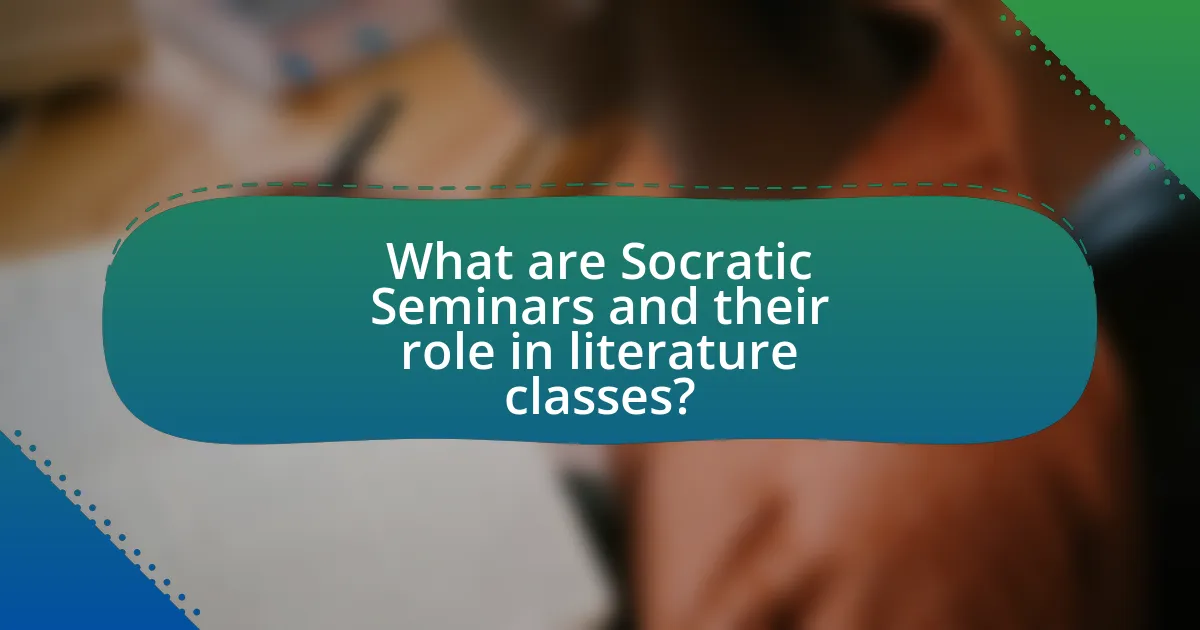
What are Socratic Seminars and their role in literature classes?
Socratic Seminars are structured discussions that encourage critical thinking and dialogue among students about a text. In literature classes, these seminars facilitate deeper understanding by allowing students to explore themes, characters, and interpretations collaboratively. Research indicates that this method enhances analytical skills and fosters a sense of ownership over learning, as students engage in questioning and defending their viewpoints. The National Council of Teachers of English supports the use of Socratic Seminars, highlighting their effectiveness in promoting critical engagement with literature.
How do Socratic Seminars encourage critical thinking?
Socratic Seminars encourage critical thinking by fostering an environment where participants engage in dialogue, question assumptions, and explore diverse perspectives. This method promotes analytical skills as students must articulate their thoughts, listen actively, and respond thoughtfully to others’ ideas. Research indicates that such discussions enhance cognitive abilities; for instance, a study by the National Council of Teachers of English found that students involved in Socratic Seminars demonstrated improved reasoning and comprehension skills compared to traditional lecture-based learning.
What techniques are used in Socratic Seminars to promote discussion?
Socratic Seminars utilize techniques such as open-ended questioning, active listening, and student-led discussions to promote discussion. Open-ended questions encourage participants to think critically and articulate their thoughts, fostering deeper engagement with the material. Active listening ensures that students respond thoughtfully to each other, building on previous comments and creating a collaborative dialogue. Additionally, student-led discussions empower learners to take ownership of the conversation, enhancing their analytical skills and confidence in expressing their viewpoints. These techniques collectively create an environment conducive to critical thinking and meaningful discourse.
How does the format of Socratic Seminars differ from traditional teaching methods?
Socratic Seminars differ from traditional teaching methods by emphasizing dialogue and critical thinking over direct instruction. In Socratic Seminars, students engage in open-ended discussions, asking questions and exploring ideas collaboratively, whereas traditional methods often involve a teacher-centered approach where information is delivered through lectures. This format encourages deeper understanding and analysis of texts, as evidenced by studies showing that students in Socratic Seminars demonstrate improved critical thinking skills and greater engagement with the material compared to those in conventional classrooms.
Why is critical thinking important in literature education?
Critical thinking is important in literature education because it enables students to analyze texts deeply and engage with diverse perspectives. This analytical skill fosters a greater understanding of themes, character motivations, and societal contexts within literature. Research indicates that students who practice critical thinking in literature classes demonstrate improved comprehension and retention of material, as they learn to question assumptions and evaluate arguments. For instance, a study by Paul and Elder (2006) highlights that critical thinking enhances students’ ability to interpret complex narratives and articulate their insights effectively.
What skills are developed through critical thinking in literature classes?
Critical thinking in literature classes develops analytical skills, interpretive abilities, and effective communication. Students learn to analyze texts critically, which enhances their ability to evaluate arguments and identify underlying themes. This process fosters interpretive skills as they engage with diverse perspectives and contextualize literary works within historical and cultural frameworks. Furthermore, critical thinking encourages effective communication, as students articulate their insights and defend their interpretations during discussions, particularly in Socratic seminars, where dialogue and debate are central to the learning experience.
How does critical thinking enhance students’ understanding of texts?
Critical thinking enhances students’ understanding of texts by enabling them to analyze, evaluate, and synthesize information more effectively. This cognitive process allows students to question assumptions, identify biases, and draw connections between ideas, leading to deeper comprehension. Research indicates that students who engage in critical thinking activities, such as Socratic seminars, demonstrate improved interpretative skills and a greater ability to articulate their thoughts about complex texts. For instance, a study published in the Journal of Educational Psychology found that students who participated in discussions that required critical analysis scored significantly higher on comprehension assessments compared to those who did not engage in such activities.
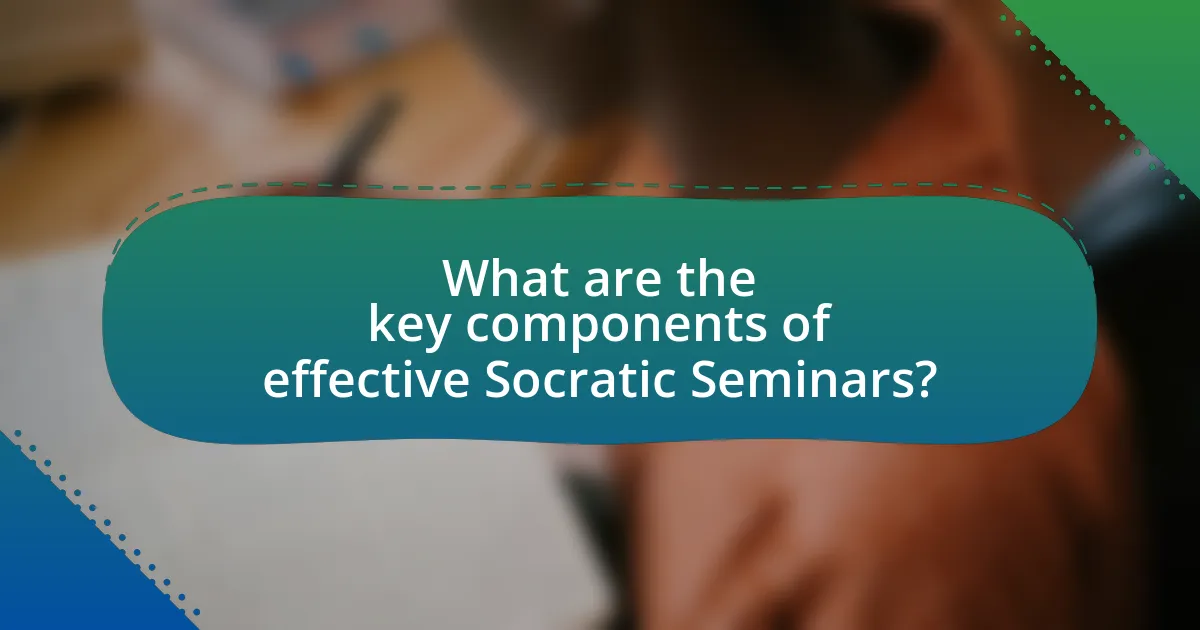
What are the key components of effective Socratic Seminars?
The key components of effective Socratic Seminars include open-ended questions, active listening, and a respectful dialogue among participants. Open-ended questions stimulate critical thinking and encourage deeper exploration of the text, allowing students to engage with complex ideas. Active listening ensures that participants fully understand each other’s perspectives, fostering a collaborative learning environment. Respectful dialogue promotes a safe space for sharing diverse viewpoints, which is essential for meaningful discussion. Research indicates that these components enhance student engagement and critical thinking skills, making Socratic Seminars a powerful pedagogical tool in literature classes.
How can teachers prepare students for Socratic Seminars?
Teachers can prepare students for Socratic Seminars by providing them with clear guidelines on discussion expectations and encouraging critical thinking through targeted questions. This preparation involves teaching students how to formulate open-ended questions, actively listen to peers, and build on each other’s ideas. Research indicates that structured preparation enhances student engagement and comprehension, as seen in studies where students who practiced these skills demonstrated improved analytical abilities and deeper understanding of texts.
What pre-seminar activities can enhance student engagement?
Pre-seminar activities that can enhance student engagement include conducting pre-seminar surveys, assigning preparatory readings, and facilitating small group discussions. These activities actively involve students in the learning process, prompting them to reflect on the material before the seminar. For instance, pre-seminar surveys can gauge students’ prior knowledge and interests, allowing instructors to tailor the seminar content accordingly. Assigning preparatory readings ensures that students come equipped with foundational knowledge, which fosters deeper discussions. Additionally, small group discussions encourage peer interaction and help students articulate their thoughts, leading to increased confidence and participation during the seminar. Research indicates that such preparatory activities significantly boost student engagement and participation levels in classroom discussions.
How can teachers create a safe environment for discussion?
Teachers can create a safe environment for discussion by establishing clear guidelines that promote respect and open-mindedness among students. These guidelines should include rules against interrupting, personal attacks, and disrespectful language, which help foster a culture of trust. Research indicates that when students feel safe, they are more likely to engage in critical thinking and share their perspectives, as shown in studies on classroom dynamics and student participation. Additionally, incorporating icebreaker activities can help build rapport among students, further enhancing the safety of the discussion environment.
What strategies can be employed during Socratic Seminars?
Effective strategies for Socratic Seminars include open-ended questioning, active listening, and encouraging student-led discussions. Open-ended questions stimulate critical thinking by prompting participants to explore multiple perspectives and justify their reasoning. Active listening ensures that students engage with each other’s ideas, fostering a collaborative learning environment. Additionally, allowing students to lead discussions empowers them to take ownership of their learning, enhancing their analytical skills. Research indicates that these strategies promote deeper understanding and retention of material, as evidenced by studies showing improved critical thinking skills in students who participate in structured discussions.
How can questioning techniques facilitate deeper analysis?
Questioning techniques facilitate deeper analysis by prompting critical thinking and encouraging exploration of complex ideas. These techniques, such as open-ended questions and Socratic questioning, stimulate students to reflect on their understanding, challenge assumptions, and articulate their reasoning. Research indicates that when students engage in discussions driven by thoughtful questions, they develop higher-order thinking skills, leading to a more profound comprehension of the material. For instance, a study by Paul and Elder (2006) highlights that effective questioning can enhance students’ ability to analyze texts critically, fostering a deeper engagement with literature.
What role does student facilitation play in Socratic Seminars?
Student facilitation in Socratic Seminars is crucial as it empowers learners to take ownership of their discussions and enhances critical thinking. By guiding conversations, students encourage their peers to explore diverse perspectives and articulate their thoughts, fostering a collaborative learning environment. Research indicates that when students facilitate, they engage more deeply with the material, leading to improved comprehension and analytical skills. This active participation not only reinforces their understanding but also cultivates essential skills such as communication and argumentation, which are vital in literature classes.
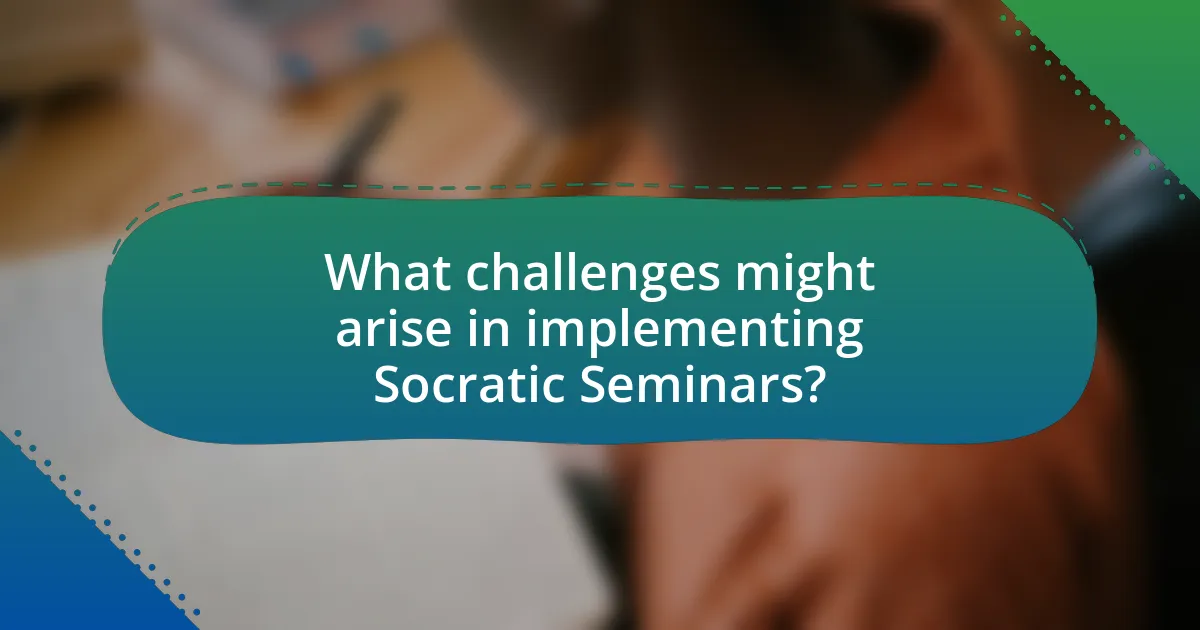
What challenges might arise in implementing Socratic Seminars?
Implementing Socratic Seminars may face challenges such as student reluctance to participate, difficulty in facilitating discussions, and varying levels of critical thinking skills among students. Student reluctance can stem from fear of judgment or lack of confidence, which inhibits open dialogue. Facilitators may struggle to guide discussions effectively, ensuring that all voices are heard while maintaining focus on the topic. Additionally, the diverse critical thinking abilities of students can lead to imbalanced contributions, where some students dominate the conversation while others remain silent. These challenges can hinder the overall effectiveness of Socratic Seminars in promoting critical thinking in literature classes.
How can teachers address student resistance to participation?
Teachers can address student resistance to participation by creating a supportive and inclusive classroom environment. Establishing clear expectations and fostering a sense of belonging encourages students to engage. Research indicates that when students feel safe and valued, their willingness to participate increases significantly. For instance, a study by the National Education Association found that classrooms with positive teacher-student relationships see a 30% increase in student participation rates. Additionally, incorporating varied teaching strategies, such as small group discussions and peer feedback, can help students feel more comfortable sharing their thoughts.
What methods can be used to encourage quieter students to engage?
To encourage quieter students to engage, educators can implement strategies such as small group discussions, one-on-one interactions, and the use of written prompts. Small group discussions create a less intimidating environment, allowing quieter students to express their thoughts more freely. One-on-one interactions provide personalized attention, which can help build confidence in sharing ideas. Written prompts allow students to formulate their thoughts before sharing, reducing anxiety associated with speaking in front of peers. Research indicates that these methods can significantly increase participation rates among quieter students, fostering a more inclusive classroom atmosphere.
How can teachers manage dominant voices in discussions?
Teachers can manage dominant voices in discussions by implementing structured turn-taking and using specific questioning techniques. By establishing clear guidelines for participation, such as limiting speaking time or using a talking piece, teachers can ensure that all students have an opportunity to contribute. Research indicates that structured discussions promote equitable participation, as shown in studies where turn-taking strategies led to increased engagement from quieter students. Additionally, employing open-ended questions encourages deeper thinking and invites diverse perspectives, further balancing the conversation.
What assessment methods can be used to evaluate Socratic Seminars?
Assessment methods used to evaluate Socratic Seminars include peer assessments, teacher observations, and reflective journals. Peer assessments allow students to evaluate each other’s contributions, fostering accountability and critical thinking. Teacher observations provide insights into student engagement and the quality of dialogue, enabling educators to assess understanding and participation. Reflective journals encourage students to articulate their thoughts and learning processes, offering a personal perspective on their engagement in the seminar. These methods collectively provide a comprehensive evaluation of student performance and understanding in Socratic Seminars.
How can peer feedback enhance the learning experience?
Peer feedback enhances the learning experience by fostering critical thinking and collaborative learning among students. When students engage in providing feedback to their peers, they are required to analyze and evaluate the work of others, which deepens their understanding of the subject matter. Research indicates that peer feedback can lead to improved academic performance; for instance, a study published in the Journal of Educational Psychology found that students who participated in peer review processes showed a significant increase in their writing skills compared to those who did not. This collaborative approach not only promotes a sense of community but also encourages students to articulate their thoughts clearly, enhancing their communication skills.
What criteria should be used to assess student contributions?
Criteria to assess student contributions in Socratic seminars include clarity of expression, relevance to the discussion, depth of analysis, and engagement with peers. Clarity of expression ensures that students articulate their thoughts effectively, while relevance to the discussion measures how well their contributions align with the seminar topic. Depth of analysis evaluates the complexity and insightfulness of their ideas, and engagement with peers assesses how well students interact, respond to, and build upon each other’s contributions. These criteria are essential for fostering a productive learning environment that encourages critical thinking and collaborative dialogue.
What best practices can enhance the effectiveness of Socratic Seminars?
Best practices that can enhance the effectiveness of Socratic Seminars include establishing clear guidelines for discussion, encouraging open-ended questions, and fostering a respectful environment. Clear guidelines help participants understand expectations, which can lead to more focused discussions. Open-ended questions stimulate deeper thinking and allow for multiple perspectives, promoting critical analysis. A respectful environment encourages all participants to share their thoughts without fear of judgment, which is essential for meaningful dialogue. Research indicates that structured discussions, such as those in Socratic Seminars, significantly improve students’ critical thinking skills and engagement in literature classes.
How can teachers continuously improve their Socratic Seminar techniques?
Teachers can continuously improve their Socratic Seminar techniques by engaging in reflective practice and seeking feedback from students. Reflective practice allows educators to analyze their own facilitation methods, identifying strengths and areas for growth. For instance, after each seminar, teachers can assess which questions prompted the most discussion and which did not resonate with students, enabling them to refine their questioning strategies. Additionally, soliciting feedback from students about their experiences can provide valuable insights into how to enhance engagement and critical thinking. Research indicates that teacher reflection and student feedback are essential components of effective teaching practices, as they foster an adaptive learning environment that responds to the needs of learners.
What resources are available for teachers to learn more about Socratic Seminars?
Teachers can access various resources to learn more about Socratic Seminars, including books, online courses, and educational websites. Notable books such as “Socratic Seminars in the Classroom” by Matt Copeland provide practical strategies and insights into implementing these discussions effectively. Online platforms like Edutopia and the Teaching Channel offer articles and videos that demonstrate Socratic Seminar techniques in action. Additionally, organizations such as the National Paideia Center provide training and resources specifically designed for educators interested in enhancing their teaching through Socratic methods. These resources collectively support teachers in fostering critical thinking and dialogue in literature classes.
